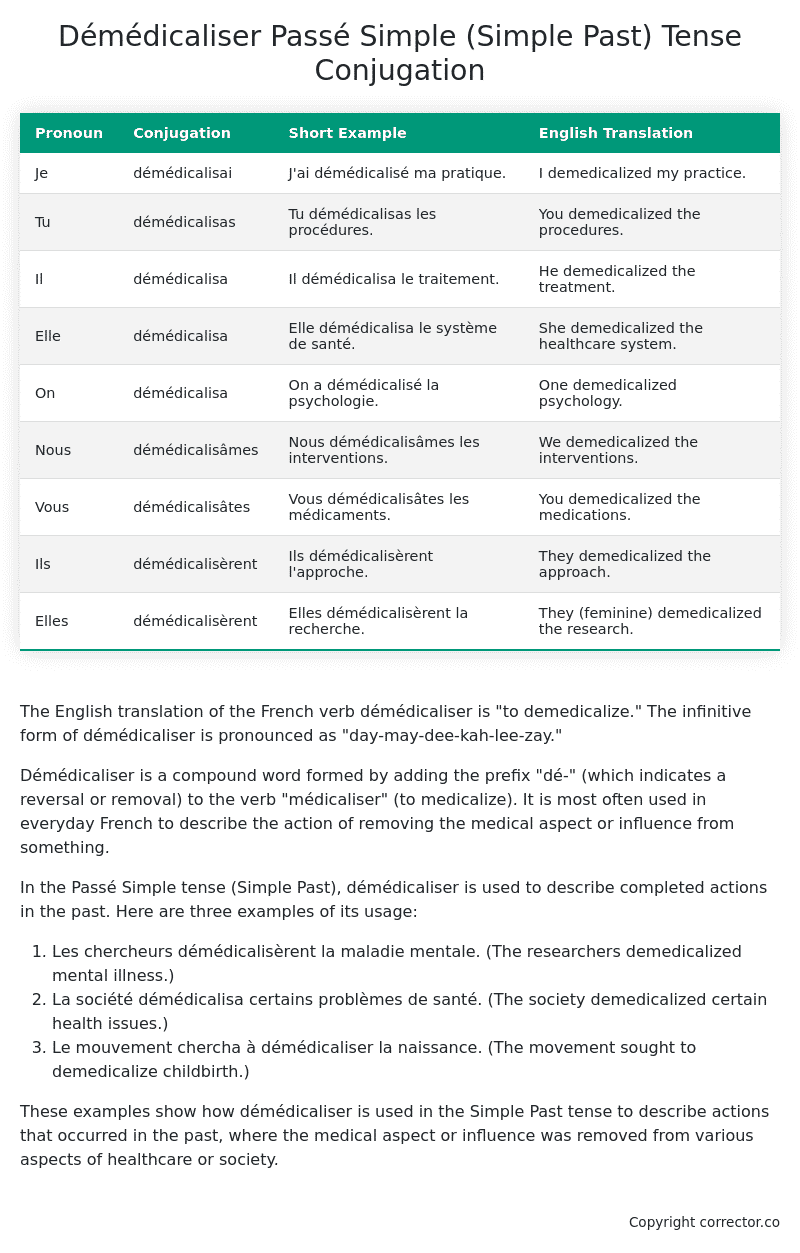Passé Simple (Simple Past) Tense Conjugation of the French Verb démédicaliser
Introduction to the verb démédicaliser
The English translation of the French verb démédicaliser is “to demedicalize.” The infinitive form of démédicaliser is pronounced as “day-may-dee-kah-lee-zay.”
Démédicaliser is a compound word formed by adding the prefix “dé-” (which indicates a reversal or removal) to the verb “médicaliser” (to medicalize). It is most often used in everyday French to describe the action of removing the medical aspect or influence from something.
In the Passé Simple tense (Simple Past), démédicaliser is used to describe completed actions in the past. Here are three examples of its usage:
- Les chercheurs démédicalisèrent la maladie mentale. (The researchers demedicalized mental illness.)
- La société démédicalisa certains problèmes de santé. (The society demedicalized certain health issues.)
- Le mouvement chercha à démédicaliser la naissance. (The movement sought to demedicalize childbirth.)
These examples show how démédicaliser is used in the Simple Past tense to describe actions that occurred in the past, where the medical aspect or influence was removed from various aspects of healthcare or society.
Table of the Passé Simple (Simple Past) Tense Conjugation of démédicaliser
| Pronoun | Conjugation | Short Example | English Translation |
|---|---|---|---|
| Je | démédicalisai | J’ai démédicalisé ma pratique. | I demedicalized my practice. |
| Tu | démédicalisas | Tu démédicalisas les procédures. | You demedicalized the procedures. |
| Il | démédicalisa | Il démédicalisa le traitement. | He demedicalized the treatment. |
| Elle | démédicalisa | Elle démédicalisa le système de santé. | She demedicalized the healthcare system. |
| On | démédicalisa | On a démédicalisé la psychologie. | One demedicalized psychology. |
| Nous | démédicalisâmes | Nous démédicalisâmes les interventions. | We demedicalized the interventions. |
| Vous | démédicalisâtes | Vous démédicalisâtes les médicaments. | You demedicalized the medications. |
| Ils | démédicalisèrent | Ils démédicalisèrent l’approche. | They demedicalized the approach. |
| Elles | démédicalisèrent | Elles démédicalisèrent la recherche. | They (feminine) demedicalized the research. |
Other Conjugations for Démédicaliser.
Le Present (Present Tense) Conjugation of the French Verb démédicaliser
Imparfait (Imperfect) Tense Conjugation of the French Verb démédicaliser
Passé Simple (Simple Past) Tense Conjugation of the French Verb démédicaliser (You’re reading it right now!)
Passé Composé (Present Perfect) Tense Conjugation of the French Verb démédicaliser
Futur Simple (Simple Future) Tense Conjugation of the French Verb démédicaliser
Futur Proche (Near Future) Tense Conjugation of the French Verb démédicaliser
Plus-que-parfait (Pluperfect) Tense Conjugation of the French Verb démédicaliser
Passé Antérieur (Past Anterior) Tense Conjugation of the French Verb démédicaliser
Futur Antérieur (Future Anterior) Tense Conjugation of the French Verb démédicaliser
Subjonctif Présent (Subjunctive Present) Tense Conjugation of the French Verb démédicaliser
Subjonctif Passé (Subjunctive Past) Tense Conjugation of the French Verb démédicaliser
Subjonctif Imparfait (Subjunctive Imperfect) Tense Conjugation of the French Verb démédicaliser
Conditionnel Présent (Conditional Present) Tense Conjugation of the French Verb démédicaliser
Conditionnel Passé (Conditional Past) Tense Conjugation of the French Verb démédicaliser
Conditionnel Passé II (Conditional Past II) Tense Conjugation of the French Verb démédicaliser
L’impératif Présent (Imperative Present) Tense Conjugation of the French Verb démédicaliser
L’impératif Passé (Imperative Past) Tense Conjugation of the French Verb démédicaliser
L’infinitif Présent (Infinitive Present) Tense Conjugation of the French Verb démédicaliser
L’infinitif Passé (Infinitive Past) Tense Conjugation of the French Verb démédicaliser
Le Participe Présent (Present Participle) Tense Conjugation of the French Verb démédicaliser
Le Participe Passé (Past Participle) Tense Conjugation of the French Verb démédicaliser
Struggling with French verbs or the language in general? Why not use our free French Grammar Checker – no registration required!
Get a FREE Download Study Sheet of this Conjugation 🔥
Simply right click the image below, click “save image” and get your free reference for the démédicaliser Passé Simple tense conjugation!

Démédicaliser – About the French Passé Simple (Simple Past) Tense
Formation
Usage
Narration
Historical Context
Interactions with other tenses
Passé Composé
Imparfait
Conditional and Subjunctive
Summary
I hope you enjoyed this article on the verb démédicaliser. Still in a learning mood? Check out another TOTALLY random French verb conjugation!


